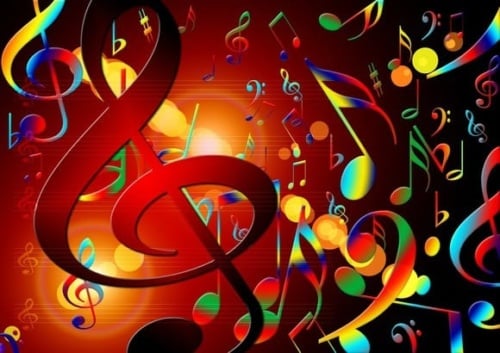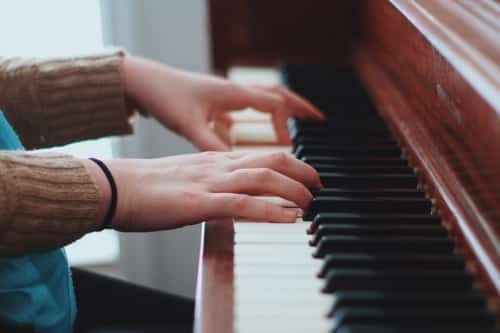https://vimeo.com/233534272
A dedicated performer discovers a love for teaching

Terry believes artists who are focused on performance are natural communicators, which, in most cases, makes them natural teachers. The inherent extroverted nature of a performer lends itself to the interactive skills necessary to sharing musical and artistic knowledge with students.
Terry believes music education is vitally important to education as a whole, as well as a general tool to engage students. After all, it was his personal experience of participating in musical activities that motivated him to keep his grades up in all areas of education. He now has the pleasure of sharing his knowledge with his students, and it has been highly successful. In fact, his efforts led to a 2014 semi-finalist nomination for the Music Educator of the Year GRAMMY award – a fitting tribute to such a fine educator.
Interview Transcript:
Dr. Berger: Terry, it’s really nice to be spending some time with you today. I’m always fascinated in all the interviews that I’m lucky enough to do to hear the background story of what brings all of us to education.
Tell us a little bit about your personal path and how your path in education steered you towards music education as a profession.
Terry Eberhardt: I think I have a pretty interesting story! The fact is that I’ve always loved music and I’ve always fancied myself being a performer. I ended up going to a private high school and played percussion. I had a teacher who really steered me into education but I was like, “There’s no way I’m going to teach. I want to be a performer!”

I got out of school in four and a half years and did a whole bunch of auditions, and wasn’t really landing a ton of work so I was like, alright. Good thing I’ve got this teaching degree!
I taught for six months at an elementary school and I fell hard in love with it. And then I got a middle school job and I did that for four years.
While I was teaching middle school, I got asked to do a lot of performing. Crazily enough, I performed while teaching and decided, okay, I’ve got to try the performance thing again.
So I went back to school and got a masters in performance. Almost immediately in that Masters program, I realized that I really wanted to be a teacher.
I finished the masters in performance, and then I was fortunate enough to land a high school job where I got to open that school. I taught high school for nine years, and while I was doing that, I taught college for six years at Towson University.
That’s kind of how I got around to being an educator. I grew up with music in my life and I wanted to be able to share it and give it back to people like it was given to me.
DB: Terry, if we were to call you the “accidental educator” in the best possible way based on the path of how you got to where you are, how can we do a better job of identifying the next Terry Eberhardt? That young person, who is out there ─ whether it’s the arts or not ─ who has passions that if honed in a thoughtful, methodical, and organized way could help open their eyes to an opportunity within education?
To backup a little, I don’t think we do a very good job of saying to young people, “There are some incredible opportunities in education and lots of different roles that you can play.” Sadly, we rely on accidental sequences of events ─ look at your story for a perfect example ─ for young people to benefit.
So how do we do a better job of identifying the next Terry Eberhardt?

Actually, what made it fun for me was that I was really using my performance training to engage students and to get them motivated and excited.
Yeah, I think it’s education ─ educating parents and students at young age that “Hey, if you’re really passionate about anything, you can use that ‘anything’ to do lots of different things like teaching.”
That would be my number one, for sure.
DB: Terry, how can we apply what you’ve experienced within your educational path to the notion that arts should not be just sort of an outlier, an afterthought to a young person’s educational experience? It’s not just a cherry on top or something that we add; it is essential to one’s learning path, to outcomes that we hope that they get to experience.
How do we take your experience and translate it into meaningful conversation and a movement where it is a critical part of education and it’s not something that we should have to continue to battle for?
We hear constant stories around the country where arts programs are marginalized and often the first to go. How do we have a more powerful conversation about their importance where we utilize a story like yours?
TE: It’s not to say that I’m the poster child for why music education or arts education is important but I was definitely that kid who wasn’t excited about anything else. It was the one thing that brought me to school every day. It was the thing that got me excited to be in the school building, and it was the thing that kept me well beyond the school day to be there and engage with instructors.
I had to have the right grades to be able to do the things that I wanted to do with my music. So it was very important to me.
And it wasn’t until I got to college that I realized that music isn’t just about increasing the other aspects of education. There is merit in it by itself; and music and art for the sake of art and music is really very important as well.
Yes, I think it’s just making sure that we look at data around students who have access to music and look at what it’s really doing for communities. Sometimes, students who are struggling in every other class excel in the arts classes. And that is really very compelling.
You can look at studies all over the world of arts programs being added to areas that are distressed or struggling in their academics, and you see that infusing them with music or an arts education really allows them to establish themselves to be stronger human beings at the end of the day. I mean, what we’re all trying to do is to create better humans.
About Terry Eberhardt:
Upon completing his Bachelor’s of Music in Vocal Performance and Music Education from the Peabody Conservatory of Music and his Masters Degree in Opera Performance at The University of Maryland Opera Studio, Terry began his teaching career at the newly opened Shady Grove Middle School in Montgomery County where he taught general music, choir and developed the theater program. Terry quickly gained a regional reputation for excellence in choral education. In 2005 Terry established the choral program at Howard County’s newest high school, Marriotts Ridge. He has also served as President of the Maryland Choral Directors Association.
During his ten-year tenure at MRHS, his students earned numerous awards and accolades for their performances throughout the eastern United States. In 2008 he was recognized as the district wide Howard County Teacher of the Year. Terry continues to serve the professional music community through his work at local universities as a voice coach, as an adjudicator for numerous choral competitions, and as a performer and director in the religious community.
Follow Terry Eberhardt on Twitter.
This article was originally posted in the Huffington Post
Author
Dr. Berger of MindRocket Media Group is an education correspondent and personality with articles in The Huffington Post, Scholastic, and Forbes.
Twitter.
